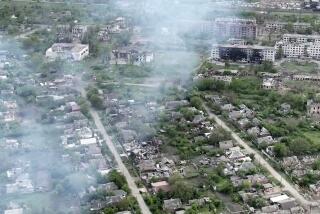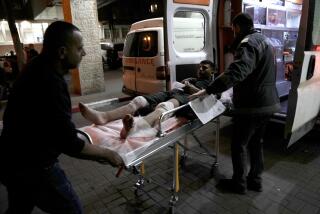Protesters in China Said to Be Killed
- Share via
BEIJING — Heavily armed riot police tightened their grip on a village in southern Guangdong province today after fatally shooting residents earlier in the week who were protesting a power project, villagers and human rights groups said.
The state media have released no information on the incident in Dongzhou village, and a police cordon has blocked access.
If the number of deaths is confirmed, however, this would be among the deadliest known incidents of official force used against Chinese citizens since the military fired on protesters in Tiananmen Square in 1989.
Local protests have increased in China, many involving land seizures, labor disputes and corruption. In most cases, local authorities manage to end them through intimidation, concessions or arrests.
“They killed 10 farmers,” said a 39-year-old resident reached by telephone, who would identify himself only by his surname, Chuang. “I saw several people near me shot in the chest.... Even during the occupation, the Japanese weren’t this bad. Now our own police are killing people.”
Other residents put the number of dead between two and 20, and said several dozen were missing in the village of 10,000.
Residents said more than 500 protesters, some carrying sticks, had gathered in front of government offices Tuesday about 10 p.m., frustrated at not receiving compensation for land seized to build a wind power plant.
The discontent had been brewing for months. But after authorities sought to detain protest leaders, the crowd tried to block police cars from moving into the village, said farmers who participated in the demonstration. Police then fired tear gas and live ammunition, they said.
Protesters scattered, the participants said. One farmer scoffed at reports that police opened fire after protesters set off explosive devices.
“We’re just farmers,” said the farmer, who identified himself only as Lin. “How could we possibly have explosives?”
Other participants said they were unsure about any explosives, given the confusion.
Provincial and local officials and police in Dongzhou and neighboring Shanwei city declined to comment.
A woman at the People’s Hospital of Shanwei, who refused to identify herself, denied anything had happened. “In small places, people often exaggerate things,” she said.
Residents said they were told by power plant managers that a substantial sum had been paid to local officials to distribute to farmers losing land, but that it was never passed on to them. Work on the $743-million project started a year ago. The two units are scheduled for completion by 2007.
“Without land, we have no income,” said Jiang, a tomato farmer with three children. “Thousands of police are all around our village. The kids’ school has been shut and our family is holed up in the house.”
“The brother of my friend was shot dead,” said Cai, an 18-year-old resident, in a telephone interview. “He was 21. His parents, brother and sister knelt crying in front of police. They’ve been crying for days.”
Some villagers said they hoped the central government would act against local corrupt officials.
“The police have total authority, they can surround villages or do whatever they want to isolate people,” said Wu Guoguang, a professor at Canada’s University of Victoria and a pro-reform government aide prior to the Tiananmen massacre. “Why would they do something so radical as to kill people?”
Human rights activists called for an independent investigation and said the incident underscored the need for reform of China’s property rules, a source of enormous local frustration.
Technically, all property still belongs to the state. Corrupt officials often exploit this to seize land that farmers have tilled for generations, then turn around and sell it to developers.
“Courts are not the answer because there’s no real law for property,” said Kenneth Roth, executive director of Human Rights Watch. “It’s a recipe for major problems.”
Residents said the police who opened fired Tuesday appeared to be from the area, but reinforcements sent later were outsiders equipped with armor, shields and machine guns. Experts said it was unclear whether local police had panicked and exceeded their authority, or whether there had been a policy shift by the central government.
“Part of the pattern is continued tension and inadequate central control over local governments,” said Sharon Hom, executive director of the New York-based Human Rights in China. “This doesn’t take Beijing off the hook, but there are tensions between local police and other arms of government. It’s not a monolith.”
Jean-Philippe Beja, a senor fellow with the Paris-based Center for International Studies and Research, said the central government usually opposes strong shows of force. But indications are that Beijing also gave more authority to local officials to deal with unrest after villagers in Taishi, also in Guangdong province, tried to eject a local official over corruption charges.
Dongzhou villagers said they had been driven to the brink of desperation. Chuang said he used to earn $1,200 a year from his farm, but without his land, he can scratch together only $40 a month doing small repair jobs.
“These corrupt officials are dogs, they eat nice meals every day and leave us nothing,” he said. “Police are everywhere, but we’re no longer afraid of death since they took our means of living.”
More to Read
Sign up for Essential California
The most important California stories and recommendations in your inbox every morning.
You may occasionally receive promotional content from the Los Angeles Times.










